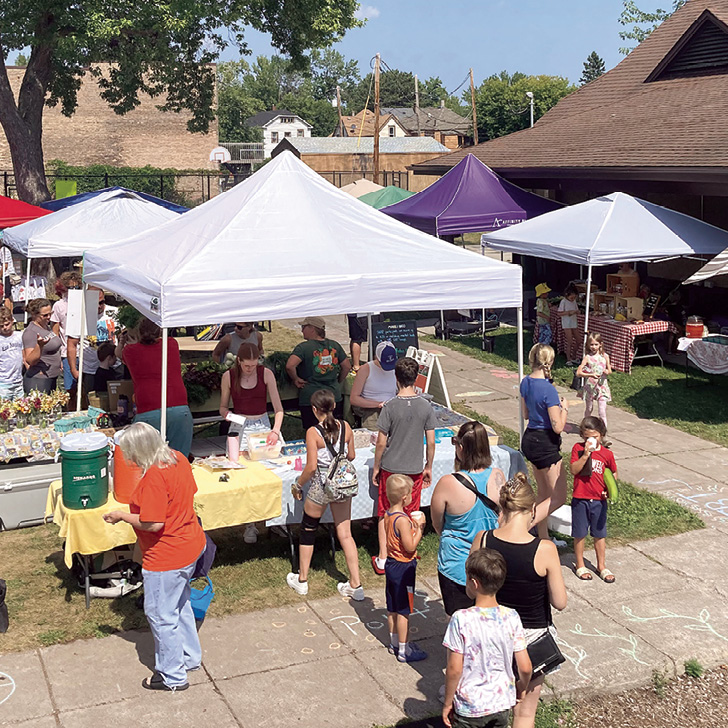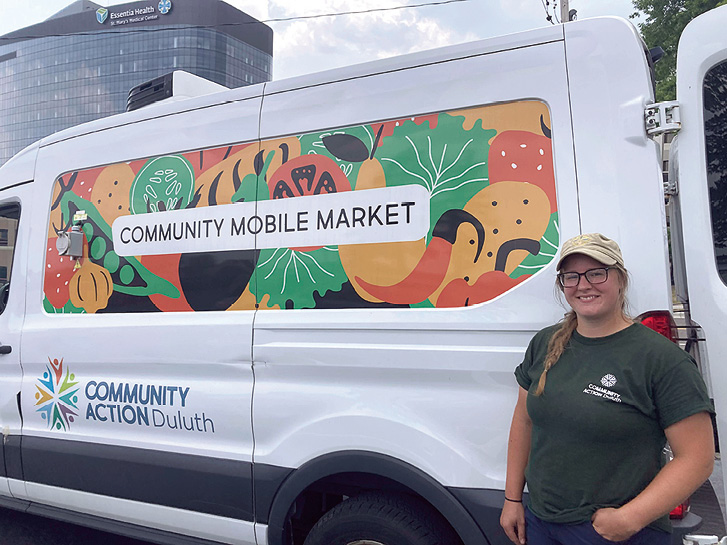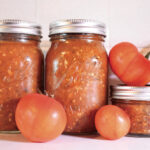What is food injustice? Let’s say you live without a car, and there are no grocery stores within miles of your home. How are you going to buy food? What if you live in housing without a full kitchen? Or you’re a senior with mobility issues?
One outstanding social service organization that works to help these folks is Community Action Duluth. This non-profit organization has a mission of empowering and engaging the community to eliminate poverty. How do they accomplish such a herculean task?
Kayla Pridmore, manager of Seeds of Success (the food program at Community Action Duluth), says the organization’s approach to combatting hunger is multi-pronged. “The best thing we can do to combat hunger is to get people out of poverty, and get them higher-paying jobs, and secure housing. So, we take a multi-pronged approach with our transitional employment services, getting people affordable health insurance, and getting people the skills they need to improve their credit, and get secure housing—all of these things are going to support better food access for people.”
But Community Action goes beyond assisting people with jobs, housing, and health insurance. They also create community in another important way: through food access.
One way they do so is with their Mobile Market—a refrigerated van which visits Duluth neighborhoods to sell local produce, dairy, and canned and dried goods at cost. They pop up in places without grocery stores, and/or very low-income places in the city.
So how do they know where to go? Pridmore says her team does a participant needs survey every two years. “We know that there’s huge chunks of folks in Duluth that have all sorts of barriers to food access. We’re popping up where we see concentrations of people reporting that they are having a hard time accessing food.”
Another way they create food access is with their weekly farmers markets in the Central Hillside and Lincoln Park neighborhoods. Pridmore calls the Mobile Market and farmers markets the “stop gaps” that can assist people struggling to get the food they need right now.
“We bring the food to the people,” says Pridmore. “We offer delivery for homebound folks. We’re out there every single day, talking to people, hearing what they need, and connecting them to our colleagues, and people in other organizations, making it work for folks.”

One of the main ways Pridmore and her Seeds of Success crew make food truly accessible is by raising grant money and contributions (such as the register round-up at the Duluth Whole Foods Co-Op), and then converting these charity donations into Power of Produce (PoP) tokens that can be distributed as free money for kids and seniors to spend on fresh, healthy produce at Community Action’s two weekly farmers markets. The PoP program offers $4 in tokens to elders over 60 and to kids under 18 to spend on produce. That’s right—all kids and seniors get free money to spend on locally grown fruits and vegetables.
So, you’ve brought your family of five to the Lincoln Park Farmers Market, and your kids have just bought a beautiful bunch of carrots, a pint of raspberries, and a head of lettuce, all grown in the local community. You’re supporting local business. Community Action Duluth has given your children their PoP tokens on the house, because otherwise they might not get to try delicious sweet peas, or experiment with a huge head of fennel that can’t be found in any convenience store. This is food justice.
But there’s more to the equation than just giving people access to high-quality, local food. There are the producers who benefit as well. In 2022, Community Action Duluth’s PoP program distributed over $8,800 dollars to youth and elders to spend on fresh fruits and veggies provided by local small business owners. Over 25 business owners were supported throughout the season.
Another jolt to local folks’ spending power are SNAP benefits (money that can be spent on food, distributed by the state of Minnesota). As Community Action Duluth says, “If your food budget isn’t going far enough, let us help you enroll in SNAP.” The organization has two “SNAP navigators” on staff to help community members apply for SNAP.
Joe Murphy, one of these SNAP navigators, says SNAP benefits are dependent on household size and income level, and that it’s worth checking if you qualify. But Murphy also aims to go beyond just solving food injustice. “I’m a firm believer in providing holistic help to people. I’ll say, ‘By the way, have you also thought about seeing if you qualify for other programs? Maybe you’re a person who’s houseless—let’s get you over to One Roof Community Housing. Have you called 211? Let’s get you into the St. Louis County housing crisis shelter.’ Things like that—trying to point people in the right directions.”
Murphy says Community Action Duluth serves about 2,000 people a year in the greater Duluth area to answer their SNAP questions.
SNAP benefits can be used at the Seeds of Success Farmers Markets, and in fact SNAP participants receive up to a $15 match to spend at the markets. Murphy says the match is a great way to take people who are already qualified and enrolled in SNAP and get them to a farmers market, connecting them to their community while doubling their spending. As Murphy says, “Economically, you’re keeping those dollars local. You’re getting whole, healthy foods into your household. You’re encouraging your family to try new recipes.”
There’s more to the Seeds of Success Farmers Markets as well—this year Pridmore secured funding to hire local musicians to perform live music every week all season at the markets. There are also tables set up at the markets with toys for kids to play with. Pridmore describes the significance of these market features: “We’re creating that social zone in the middle, because that’s one of the things that poverty can steal from people, right? That sense of community, and belonging. It’s also something that the pandemic really impacted. So, we are really trying to make those social connections.”
Between the Mobile Market, two weekly farmers markets, and SNAP navigators, Community Action Duluth fulfills a huge role at increasing food access in Duluth.
See the magic at the Hillside Farmers Market every Tuesday from 2-5 p.m. at the Essentia Health Campus on the corner of E 3rd St and N 5th Ave E. Then, take your family to get more local produce every Thursday from 3-6 p.m. at the Harrison Community Center, 3002 W. 3rd St. Both markets run through the end of September. The Mobile Market schedule for the Duluth and Proctor areas is available on the Community Mobile Market page on Facebook.






